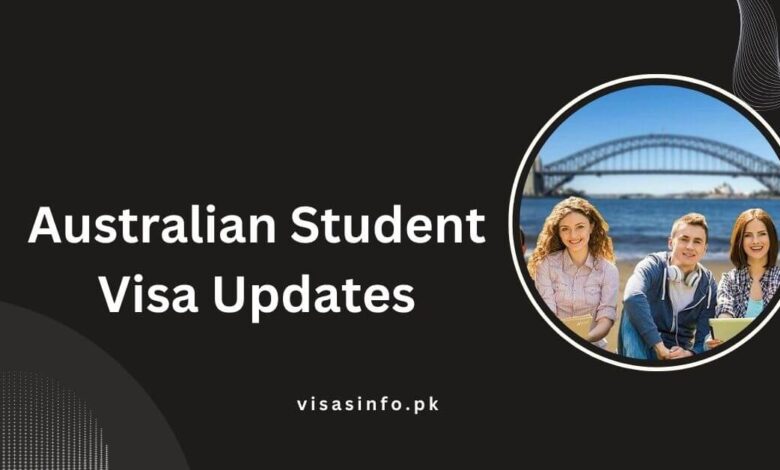Australian Student Visa Updates 2024 – Processing Time

This article addresses the current processing timeframes and delays for Australian visas in 2023. We have observed that visa applications are being processed with a remarkable delay; some are taking over two months. You may be interested in the reasons for the delays and the explanations for the extended turnaround times.
We have received reports of delays from a variety of sources, such as educational institutions, immigration agencies, and applicants. These delays are affecting several visa categories, such as those for skilled migration and students.
Causes of Visa Delays
A Significant Number of Visa Applications
One of the primary causes of these delays is the substantial volume of visa applications that are submitted daily. There has been an exceptionally high demand for Australian visas, particularly among skilled migrants and international students as categories. The Department of Home Affairs is experiencing a strain on its processing resources and capabilities as a result of the surge in applications.
Regular Visa processing procedures have also been disrupted by the COVID-19 epidemic. The reassignment of numerous staff members to pandemic-related responsibilities has resulted in a reduction in the processing capacity for visa applications in the immigration and visa processing divisions.
Modifications to the Visa Processing Process
Visa processing procedures for trade courses have undergone modifications. These modifications have resulted in longer processing periods, which have further complicated the visa application process. It is imperative to recognize that the delays affect a variety of visa types, rather than a single category. As a result, a significant number of petitioners are not receiving their visas immediately.
In order to provide you with a more comprehensive understanding of the situation, we will deconstruct the processing timeframes and delays for a variety of visa categories, with a particular emphasis on student visas and the challenges being faced by applicants.
Student visas
The delays in granting visas have impacted a significant number of students who aspire to study in Australia. These students asserted that they were unable to commence their courses on time due to the lengthy processing times. Delays have been perceived as irritating by both educators and students.
Students’ academic journeys have been disrupted as a consequence of the necessity to postpone their education. Educational institutions have also been affected by the necessity of adjusting their admissions procedures. Immigration professionals and student counselors are granted restricted access to the visa application process. This has impeded their ability to offer their clients the necessary support. Consequently, numerous pupils have been compelled to independently manage the visa application process.
Benefits of Australian Student Visa Processing Time and Delays
- Enhanced Planning: Students can more effectively plan their presence in Australia, course start dates, accommodation, and travel arrangements by being aware of the visa processing times.
- Timely Preparation: By anticipating potential delays, students can submit their applications in advance, thereby minimizing the likelihood of missing critical deadlines, such as the commencement of their academic program.
- Reduced tension: Students are granted peace of mind during the visa application process by setting clear expectations regarding visa processing times, which alleviates tension associated with last-minute arrangements.
- Enhanced Document Management: Students are more inclined to submit all necessary documents, including financial proof, health insurance, and language proficiency, promptly when they are informed of potential delays. This is done to prevent additional delays.
- Alternative Planning: If delays appear to be unavoidable, students may opt to enroll in temporary online courses, request deferrals from universities, or apply for bridging visas if necessary.
- Global Conditions Awareness: Delays in visa processing may occasionally be caused by global factors, such as policy changes or increased demand. Students can remain adaptable and investigate temporary alternatives while they await visa approval by being aware of these possibilities.
- Early Course Access: In certain instances, students may be able to obtain early access to their courses by comprehending administrative timelines, which can be achieved through provisional enrollment, online access, or short-term visas.
Student Policy in Australia
Australia’s immigration and student policies have encountered challenges as a result of these delays. In the global soft skills Gap report, Australia’s higher education sector is rated lower than that of other nations. This has impacted the international reputation of Australian institutions and their ability to attract foreign students.
The issues with student visas have prompted concerns regarding Australia’s student retention rates. Despite the enthusiasm of numerous students for studying in the country, the delays in visa processing have resulted in uncertainty and disruption of their academic plans. The International Education sector has been affected by the delays in obtaining visas.
International education providers have encountered significant challenges in maintaining enrollment levels due to the pandemic’s obstacles and the delays in obtaining visas.
Check Also: ESOS Act for International Students in Australia
Recommendations
- In light of the visa delays, there are a few things to consider when applying for an Australian visa.
- Ensure that your financial account is up to date: Ensure that your bank account is both active and current. This is still significant because it is a component of the visa application process.
- Statement of account: Request a statement of account from your financial institution. This will illustrate your capacity to finance your education and manage your finances while studying in Australia.
- Diplomas and experience letters: It is feasible to submit diplomas and experience letters during the visa application process. During the visa interview, you anticipate cross-examination, which is why these records are essential for verifying your credentials and employment history.
- Tuition: If feasible, consider prepaying the entire year’s tuition in advance. This can have a positive impact on your visa application, particularly for nations that are part of the Judicial Court (JC) and Student Direct Stream (SDS), such as the United States and Canada, that are pursuing visa initiatives.
- Read up on the subject to prepare for your visa interview. The visa officer has the authority to query and cross-examine you. It is essential to have confidence in your responses and to support them.
- Refrain from employing unapproved intermediaries or shortcuts when applying for a visa. It is essential to follow the appropriate application procedures and seek guidance from reputable sources.
- Continue to be patient: Although it may be frustrating when the Visa application process exceeds the anticipated duration, you must await the results. Avoid making impulsive decisions or reacting in a frenzy.
Conclusion
In conclusion, the delays in the processing of Australian visas, particularly for student visas, have presented challenges for both petitioners and educational institutions. The delays have been exacerbated by the COVID-19 pandemic, a significant number of applications, and changes to the visa processing process for vocational courses.
To surmount these challenges, candidates should adhere to the advice previously provided, demonstrate patience, and comprehensively prepare for their visa interviews. It is imperative to remain informed about the most recent developments, regulatory modifications, and Visa processing. Given the current state of instability, applicants must seek advice from reputable sources regarding the appropriate completion of the visa application process.
The current visa delays may affect the academic objectives of students; however, with the appropriate planning and support, they can surmount these challenges and continue their education in Australia.
Frequently Asked Questions:
-
Why is my Australia student visa taking so long?
Many circumstances can affect how long your Australian visa takes to get processed. These include factors such as whether your visa application is complete and all the supporting documentation is included. The time taken to respond to Australian Home Affairs’ requests for additional information.
-
Is it difficult to get student visa for Australia?
It is easier to get an Australian student visa than other countries. Students wanting to study in Australia must meet certain requirements to qualify for a visa.
-
Which intake is best for Australia?
International students can apply to study in Australia during three different semesters: the first in February, the second in July, and the third in November. The first semester is the most popular choice for overseas students, and if you miss the February intake, don’t worry.



